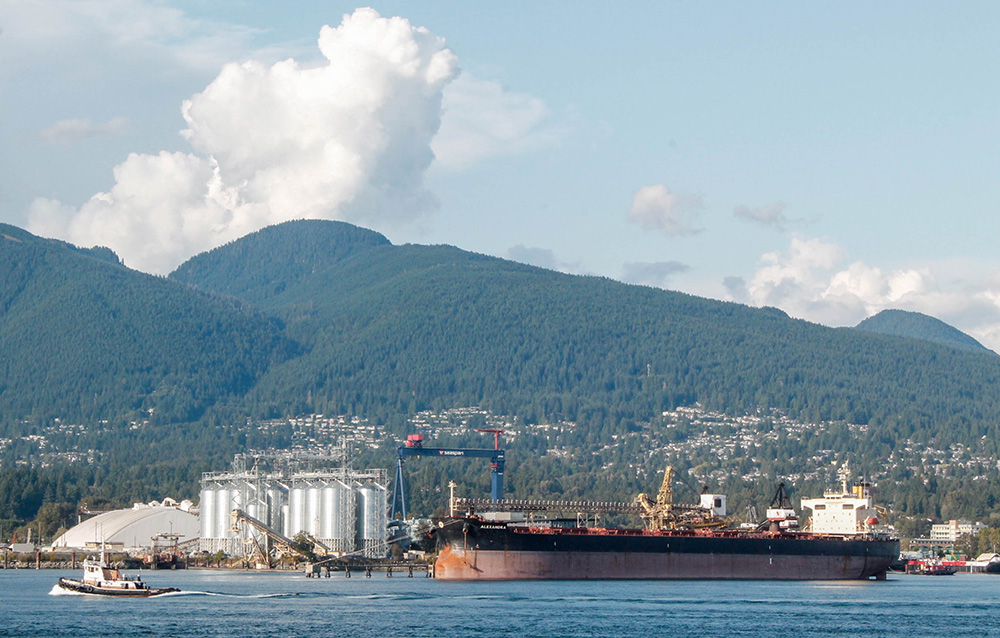The District of North Vancouver’s tax base may have dodged a several-million-dollar bullet thanks to a recent B.C. Court of Appeal ruling.
The court case was between the ship-building company Seaspan, and BC Assessment and the District of North Vancouver. Seaspan argued that because its shipyards on the Burrard Inlet are polluted with creosote, a sticky tar-like substance and possible carcinogen, the land should have been assessed at a lower value for property tax reasons from 2013 to 2019.
If the courts had ruled in Seaspan’s favour, the district would’ve been required to return a large chunk of change in the form of previously collected property taxes to the company. How much isn’t clear — the District of North Vancouver declined an interview when contacted for this story and in 2019 told The Tyee there were too many factors at play to make a guess.
A 2020 annual report, however, shows the district had put aside $6.8 million for the “Seaspan tax reassessment recognition.”
Luckily for the DNV’s tax base, the court found that Seaspan would not get a tax break for owning polluted land, and in fact could owe additional property taxes.
In addition to being a win for the DNV, the ruling is also a potential step forward for environmental efforts focused on incentivizing the remediation of polluted lands, including those known as brownfields. Brownfields are polluted sites that are not currently in active use. The Seaspan site is not classified as a brownfield because it is an active industrial operation heavily used by the company.
Property tax rates are based on a land's assessed value, which is calculated annually by BC Assessment based on what a property could reasonably be sold for that year.
Seaspan argued that if there is pollution that needs remediation a property should be worth less because a hypothetical buyer would need to foot the remediation bill too.
This is a tactic used by dozens of companies in B.C. when dealing with brownfields and other polluted sites, says Derek Holloway, a retired BC Assessment senior appraiser. A company can sit on polluted land and appeal its assessed value in order to pay low property taxes instead of paying for costly remediation.
Holloway points to a property in Burnaby as an example, where pollution changed the assessed value of a site from $6 million in 2000 to just $2 in 2001 — less than the cost of a coffee. Today, after remediation, the property is worth $46.5 million.
The provincial government told The Tyee it has a database that identifies 25,000 sites in B.C., some of which are contaminated, some remediated and some that were investigated and found not to be contaminated. The Ministry of Environment told The Tyee it estimates there are between 6,000 to 10,000 brownfields in B.C.
This tactic could have worked for Seaspan if it wasn’t for a remediation order issued by the province in 2010 that told Seaspan and the site’s previous owner, Domtar, to clean the site up.
The site's polluted history dates back to the 1920s. From 1924 to 1965 Domtar ran a creosote wood preserving plant on the site, which polluted the land and groundwater, according to the Environmental Appeal Board.
The land changed ownership in 1965 when it was bought by Seaspan. According to the appeal board Seaspan was fully aware of the site’s polluted status and therefore took on the responsibility to contain and clean up the pollution.
The provincial government noticed creosote was leaching into the Burrard Inlet in 1995 and asked Seaspan and Domtar to come up with a remediation plan. The two companies argued over who should foot the bill for 15 years before the province issued a remediation order in 2010, which named both companies as responsible for paying for remediation.
The total remediation will cost around $50 million, most of which has already been paid, according to the B.C. Court of Appeal ruling.
Because the provincial remediation order said Seaspan and Domtar had to pay for site cleanup a hypothetical new buyer would not be responsible for site cleanup and therefore not liable for the cost of it, said judge David Harris in the ruling. That means the site’s assessed value would not decrease but possibly increase, as the hypothetical buyer would be protected from the cost of cleanup.
B.C. businesses will no longer be “rewarded for polluting or buying a polluted property and not doing their due diligence to clean it up,” Holloway says.
This is the first time the courts have said a provincial remediation order protects the value of a property, says Bruce Hallsor, council for BC Assessment.
Hallsor says the ruling on the Seaspan case will likely mean BC Assessment will no longer say a polluted site’s value is depreciated when there is a remediation order involved.
But Hallsor added a caveat: the province issues remediation orders fairly rarely, so it likely won’t impact that many sites.
The Tyee asked B.C.’s Ministry of Environment and Climate Change Strategy how many properties have remediation orders attached to them, if those sites are also considered brownfields and if the Seaspan case will change how the province issues remediation orders, but did not hear back by press time.
For environmental lawyers, Hallsor said, a more important decision regarding brownfields emerged from a 2017 ruling that helped define the valuation of sites with lingering pollution.
In that case, which he was also involved in, Victory Motors in Abbotsford argued that an old gas station site should pay lower property taxes because of pollution. But the area was redeveloped and shops were opened, despite this pollution — so the site had demonstrable value, Hallsor says.
The rulings in the Victory Motors case and the Seaspan case mean that owners of brownfields and other polluted sites will likely be not allowed to pay reduced property taxes if the site has a profitable business on it, or if the pollution catches the attention of the Ministry of Environment and is ordered to be cleaned up.
When contacted for comment Seaspan replied with a statement saying it was waiting for the Property Assessment Appeal Board to finish its assessment of the site.
While it’s possible Seaspan could owe more taxes than it paid, it’s also possible that the company could still be entitled so get a fraction of its property taxes back, Hallsor says. Creosote is a tricky thing to clean up. There will always be creosote on site, even after the remediation is complete, according to the Property Assessment Appeal Board. So a new hypothetical site buyer might want a small discount, thereby reducing the site value slightly, Hallsor says. This will be nothing like the discount they were hoping for previously, he adds.
Seaspan has until Feb. 19, 2023, to decide if it wants to take the case to the Supreme Court of Canada. ![]()
Read more: Labour + Industry, Environment
















Tyee Commenting Guidelines
Comments that violate guidelines risk being deleted, and violations may result in a temporary or permanent user ban. Maintain the spirit of good conversation to stay in the discussion.
*Please note The Tyee is not a forum for spreading misinformation about COVID-19, denying its existence or minimizing its risk to public health.
Do:
Do not: